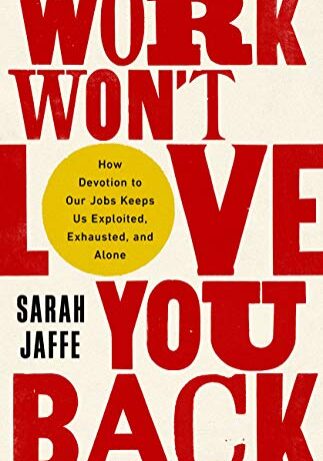
You know the idea. “The only way to be truly satisfied is to do what you believe is great work,” Steve Jobs told graduates at Stanford University’s 2005 commencement. “And the only way to do great work is to love what you do.”
But for workers around the country, the feelings just aren’t mutual. That’s the point, more or less, of a new book by Sarah Jaffe called Work Won’t Love You Back.
“It’s become especially important that we believe that the work itself is something to love,” Jaffe writes at the beginning of her book. “If we recalled why we work in the first place—to pay bills—we might wonder why we’re working so much for so little.”
She goes on to tell a bitter story that goes something like this: Your job needs you to want something other than money so that you’ll settled for something other than money.
According to historian Jill Lepore, who surveyed this conversation in the New Yorker, the idea of love or “meaning” at work wasn’t a mainstream category until the 1970s, and when it did enter our consciences, it came, not from sociologists, but sloganeers. And, to Jaffe’s point, the rise in affectionspeak corresponded with stagnating wages and quality of life — the ostensible reasons for working. For example, in 1970, Americans in the top tenth earned 6.9 times as much as the bottom tenth ($63,512 versus $9,212), but, in 2016, the top tenth of the income distribution earned 8.7 times as much as Americans in the bottom tenth ($109,578 versus $12,523).
That workers need more collective leverage, more worker-directed love, in the workforce now seems like a given. You can see it from national political shifts to bipartisan support for unions to the recent passing of the PRO Act by the House of Representatives.
In reality, evaluating the state of the worker proves tricky. For example, despite mass decrying of the rich-poor income gap, some research suggests that the gap is growing only because of shrinking poverty rates. A similar phenomenon exists among talk of the middle class. Wages are down by one metric, but up by another, even while inequality based on gender and race persists.
But whether the numbers point to a bleak or bright economic future obscures a pressing question raised by Jaffe, et al. You can hardly question that the romanticization of work hasn’t produced healthier worklives. Or homelives. The wealthiest Americans, broadly speaking, work around the clock, and as Jaffe puts it, fetishize it. Remember Steve Jobs? We’ve seen the movies.
We know the idea that work, in the Christian conception, comes by God’s design and with his pronouncement: It is good. But that doesn’t mean that marketeers’ love-of-job slogans hold up against the fallen-world realities of our daily work. The question remains whether love is an appropriate category for what most people experience as a one-sided coupling. At least, it’s time for a DTR.





